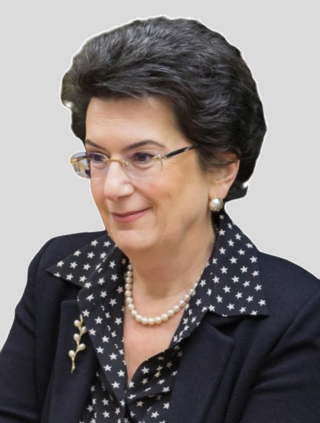
Nino Burjanadze is a Georgian politician and lawyer who served as Chairperson of the Parliament of Georgia from November 2001 to June 2008. As the first woman, she has served as the acting head of state of Georgia twice; the first time from 23 November 2003 to 25 January 2004 in the wake of Eduard Shevardnadze's resignation during the Rose Revolution, and again from 25 November 2007 to 20 January 2008, when Mikheil Saakashvili stepped down to rerun in the early presidential elections. She withdrew into opposition to Saakashvili as the leader of the Democratic Movement-United Georgia party in 2008. In October 2013, she ran in the presidential election, competing against 22 candidates. She ended third with 10 percent of the vote.

United National Movement also colloquially known as the Natsebi is a pro-Western liberal-conservative political party in Georgia founded by Mikheil Saakashvili, which rose to power following the Rose Revolution.
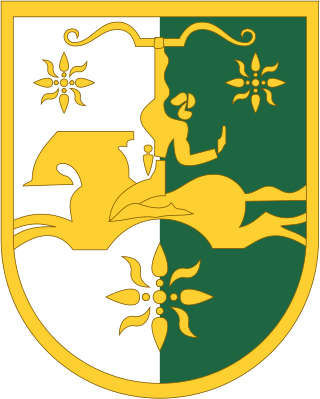
Politics in Abkhazia is dominated by its conflict with Georgia. Abkhazia became de facto independent from Georgia after the 1992–1993 war, but its de jure independence has only been recognised by a few other countries. Abkhazia is a presidential representative democratic republic with a multi-party system, wherein the President is both head of state and head of government. Executive power is exercised by the government of the Republic of Abkhazia. Legislative power is vested in both the government and the People's Assembly of Abkhazia.
The Kodori Valley, also known as the Kodori Gorge, is a river valley in Abkhazia, Georgia's breakaway autonomous republic. The valley's upper part, populated by Svans, was the only corner of the post-1993 Abkhazia directly controlled by the central Georgian government, which since 2006 officially styles the area as Upper Abkhazia. On August 12, 2008, Russo–Abkhazian forces gained control of the Upper Kodori Valley, previously controlled by Georgia.

The Georgian–Ossetian conflict is an ethno-political conflict over Georgia's former autonomous region of South Ossetia, which evolved in 1989 and developed into a war. Despite a declared ceasefire and numerous peace efforts, the conflict remained unresolved. In August 2008, military tensions and clashes between Georgia and South Ossetian separatists erupted into the Russo-Georgian War. Since then, South Ossetia has been under a de-facto Russian control.
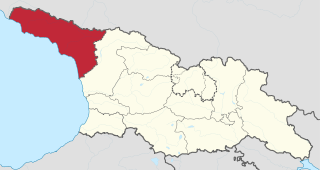
The Government of the Autonomous Republic of Abkhazia is an administration established by Georgia as the legal and only government of Abkhazia. Abkhazia has been de facto independent from Georgia – though with limited international recognition – since the early 1990s. Ruslan Abashidze, elected in May 2019, is the current head of the government-in-exile.
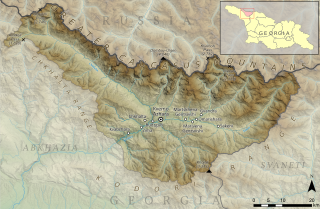
Upper Abkhazia, commonly known by its administrative name, Azhara Municipality is a geographical term and municipality of the Government of the Autonomous Republic of Abkhazia. The term was first introduced in 2006, to denote the northeastern part of the disputed territory of Abkhazia, that had remained under Georgian control after the 1992 War in Abkhazia. From September 2006 to August 2008 its main village, Chkhalta, hosted the Government of the Autonomous Republic of Abkhazia and was the seat of the Azhara municipal community. This situation came to an end in the Battle of the Kodori Valley in August 2008, when Upper Abkhazia was conquered by the Russo-Abkhazia armies, which had already controlled the rest of Abkhazia. Even though the area was no longer controlled by Georgia, the Georgian Government kept its municipal status as a sign of not recognizing any changes to the Abkhazian administrative divisions made by the breakaway republic. The current seat of the municipal government-in-exile is Tbilisi.
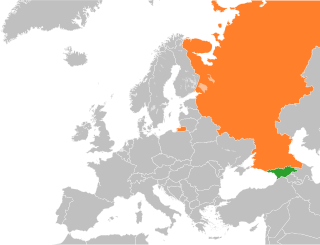
Contacts between Russia and Georgia date back to the 15th and 16th centuries, and the most important stage started in the 1580s, when the Georgian kingdom of Kakheti and the Russian Empire signed a treaty of alliance in 1587. Relations between the two countries developed vibrantly and culminated in the Treaty of Georgievsk, which established eastern Georgia as a protectorate of Russia. At that time, Georgia saw Russia as a powerful Christian and modernizing neighbor, capable of protecting Georgia from invading Muslim empires and North Caucasian raiders.

In 2007, a series of anti-government protests took place across Georgia. The demonstrations peaked on 2 November 2007, when 40,000–50,000 rallied in downtown Tbilisi, the capital of Georgia. People protested against the allegedly corrupt government of president Mikheil Saakashvili. Protests triggered by detention of Georgian politician Irakli Okruashvili on charges of extortion, money laundering, and abuse of office during his tenure as defense minister of the country were organized by the National Council, an ad hoc coalition of ten opposition parties, and financed by the media tycoon Badri Patarkatsishvili. Demonstrations occurred both in September and November 2007 and were initially largely peaceful. The protests went downhill by 6 November 2007, but turned violent the next day when the police, using heavy-handed tactics, including tear gas and water cannon, unblocked Rustaveli Avenue, Tbilisi's main boulevard, dislodged the protesters from the territory adjoining to the House of Parliament, and prevented the demonstrators from resuming the protests. The government accused the Russian secret services of being involved in an attempted coup d'état and declared a nationwide state of emergency later that day which lasted until 16 November 2007.

The prelude to the Russo-Georgian War is the series of events, including diplomatic tensions, clashes, and skirmishes, that directly preceded the August 2008 war between Georgia and the Russian Federation. Though tensions had existed between the two countries for years and more intensively since the Rose Revolution, the diplomatic crisis increased significantly in the spring of 2008, namely after Western powers recognized the independence of Kosovo in February and following Georgian attempts to gain a NATO Membership Action Plan at the 2008 Bucharest Summit; and while the eventual war saw a full-scale invasion of Georgia by Russia, the clashes that led up to it were concentrated in the breakaway republics of Abkhazia and South Ossetia, two separatist Georgian regions that received considerable Russian support over the years.

The 2008 Georgian drone shootdowns refer to a series of military incidents involving Georgian unmanned aerial vehicles brought down over the breakaway republic of Abkhazia between March and May 2008. The skirmishes were part of a larger context of tensions between Georgia and Russia, eventually leading up to the Russo-Georgian War.

Democratic Movement – United Georgia is a political party in Georgia chaired by Nino Burjanadze; it was founded on 24 November 2008. The secretary-general of the party is Vakhtang Kolbaia.
Events in the year 2012 in Georgia.
Events in the year 2014 in Georgia.
The events in 2010 in Georgia.
The following lists events that happened during 2005 in Georgia.











